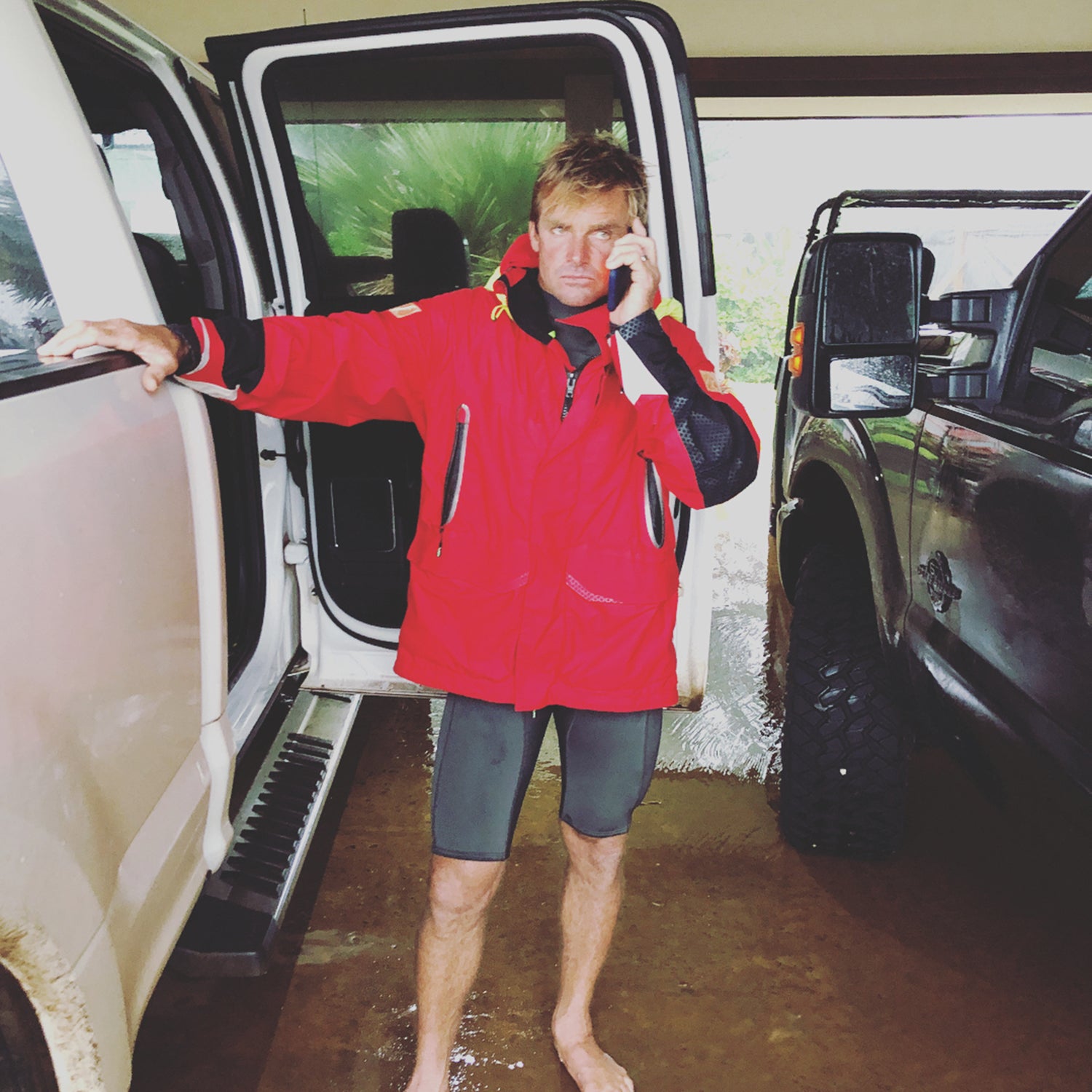It’s around midnight on Saturday, April 14, and Laird Hamilton lies awake in bed. For the last six or seven hours, he’s listened to the cracks of lightning outside his house—the worst he’s heard in a lifetime spent on Hawaii. Every minute, electric bolts flash through the sky, followed by deep rumbles that seem to shake the small island of Kauai. At 4:30 a.m., Hamilton gets a call from a worried neighbors. The waters have nearly reached their house. Hamilton gets to work.
He leaves from a river access point by his home, the same he’s used to tow out on jet-skis to the the massive waves that made him a legend, and he heads toward the family’s home.
It would be the first of 75 rescues made by Hamilton over the next six days as Hawaii was flooded by . According to NPR, a gauge in Hanalei measured 28 inches of rain in less than one day—just an inch short of the all-time record. The downpour has probably exceeded this, as the gauge recently stopped working.
A series of mudslides followed the rains, cutting off road access and stranding families, as well as flooding most of the boat access points that could serve as launching pads for rescue—nearly all except Hamilton’s. Almost immediately, Hamilton and and a group of lifetime residents of Kauai—whom Hamilton calls his ohana, or family—turned his access point into rescue operation headquarters, where they’ve been gathering supplies and resources, and, when needed, scooping up families from atop their roofs and taking them to safety.
We caught up with Hamilton Friday to better understand the gravity of the situation and how the island is responding.
�����ճ����ٷ�:��What’s it look like out there?
HAMILTON: It’s flooding at entirely new and catastrophic levels. During the first few days, I traveled with a crew of guys helping get people out of homes where they had lost all road access. We took them to shelters at higher ground and rounded up as many supplies as we could. Now that the rain has died down a little bit, our worry is infectious disease. Septic systems are busted and, in a tropic place like this, there’s tons of organic material that’s now composting, which creates a real opportunity for things like staph infection or mosquito-borne diseases to fester and breed.
What about your house?
I’m actually at my house right now, trying to assess the damage. I’m lucky that my place sits at a higher elevation, so I was far better off than many. That’s why I’ve been so insistent on helping those who I can. When the mudslides started, part of a nearby hill crashed through the walls of my garage and gym. It threw a ton of debris onto the property, cutting off a substantial portion of the road. But it hit my neighbor worse. It was nearly pushed into the river. It likely would’ve gone all the way if not for a big tree that stopped it.
What will this do, long-term, to the island?
There are people who have lost their homes entirely and can’t afford to just buy a new one, areas that will never see vegetation grow again, and roads and other infrastructure that will take years to rebuild. But, all that said, I always tell people that Hawaii is unlike any place you’ve ever been or will ever go. The community that we have here and people’s willingness to give what they can is incredible. That’s where ohana comes from. It’s your family, your community. Sure, we have some people looting and stealing, but we have a far larger group of people who doing everything they can to give back. And that’s pretty special.
How about you? How are you feeling?
I’m definitely exhausted. I have a few ailments that I’m used to living with, but they flared up after days of 4 a.m.wake-up calls and days spent pushing 50-plus pounds of diesel and propane tanks, moving boats, climbing up on things, and the like. But, honestly, I don’t even care. When you get into these kind of physical endurance challenges, it’s almost like your body switches into a whole new gear and sets a new normal. You don’t need sleep, you don’t need food. And, when it’s all said and done, I have no reason to complain. I want to be out there helping.
How can people on the mainland help?
At this point, we have a number of different organizations and agencies that have been hugely helpful in airlifting people out of dangerous situations, providing food and clean water, and helping to restore road access. Many of those people are still using my river access as a launching pad, since it remains one of a small number of navigable areas on island. Right now, what we need most is money. I know that it’s not the most glamorous thing to give, but many of the people who have lost the most are the ones who don’t have the means to just replace it all.
This conversation has been edited for clarity.


